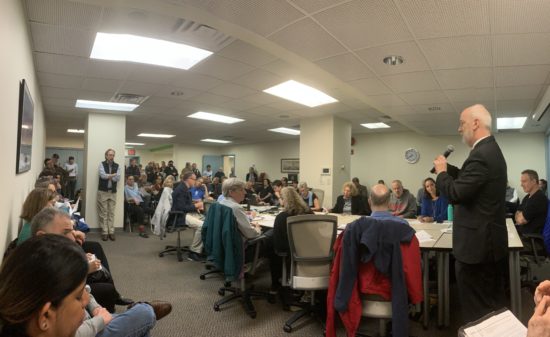
By Alex Israel
Parking rules on the Upper West Side have inspired some of the most intense debates in the neighborhood over the past couple of months — and now a local committee wants the city to give it hard numbers to work with before deciding on an updated approach.
Community Board 7’s Transportation Committee passed an updated resolution requesting a study on curbside usage, following demands for revisions to an initial proposal reviewed by the full board earlier this month. The resolution will likely not go back to the full board for another vote until the board’s February meeting.
This resolution is the result of a back-and-forth spanning several months, starting with an initial request by the committee in May to eliminate free parking, which was then broadened following feedback received during a public forum, before ultimately being referred back to committee after some of the full board’s members felt the language was still too strong.
In a Transportation Committee meeting on Tuesday, CB7 Chair Mark Diller kicked off the conversation by explaining the process of adopting community board resolutions—which requires first that a majority of the committee, then that a majority of the board votes to approve. Diller then promised that he would delay the resolution from being presented at the full board vote until at least February to “allow for smaller group conversations to occur,” outside of the committee.
“One of the things that I am hoping to do in my tenure as chair of he board is to work toward greater than majority consensus … It occurs to me that a big meeting like this may not be the best opportunity to forge that consensus,” Diller said.
Transportation Committee Chair Howard Yaruss opened up the discussion, introducing the suggested revisions to a packed room of fellow committee members, non-committee board members, and the public.
The full text of the new resolution, which incorporated many of the suggested revisions from the Full Board meeting, is below:
Our community currently suffers from traffic congestion, rampant double parking particularly due to growing e-commerce deliveries, significant “cruising” for parking and a substantial number of injuries to street users.
Congestion pricing is scheduled to be implemented in just over one year and community residents and business owners have expressed concern about the impact of this new policy.
How we use our curbside space has remained largely unchanged for many decades while our City has changed dramatically. The City owned land should be used for the greatest good for the greatest number of people, with a particular focus on the needs and concerns of the residents and businesses of our community.
THEREFORE, BE IT RESOLVED THAT Community Board 7/Manhattan requests that the City: (1) assess current policy regarding parking and curbside usage, (2) advise us as to whether there are policies that could provide greater benefit to the community, improve traffic flow and promote safer streets, including, but not limited to, paid residential parking permits, metering with surge capability and lessons learned from the practices of other major cities, and (3) conduct studies both before and after the implementation of congestion pricing to establish its effect on the community.
Following a pattern of discussion during prior meetings about the resolution as well as a broader public forum on curbside use, Upper West Siders were split.
Local residents who spoke against the resolution remain worried that both the board and the city hold an inherent bias that will result in the reallocation of curbside space away from free parking. Many made arguments in favor of maintaining the current allocation—if not adding more free parking spaces.
“I couldn’t have a car if I couldn’t park it [for free] on the street,” said an Upper West Sider of 46 years. For her, any removal of free spaces would be “government interfering with our rights.”
“The elites don’t want us to have cars,” argued another dissenter. “We need to get our spaces back.”
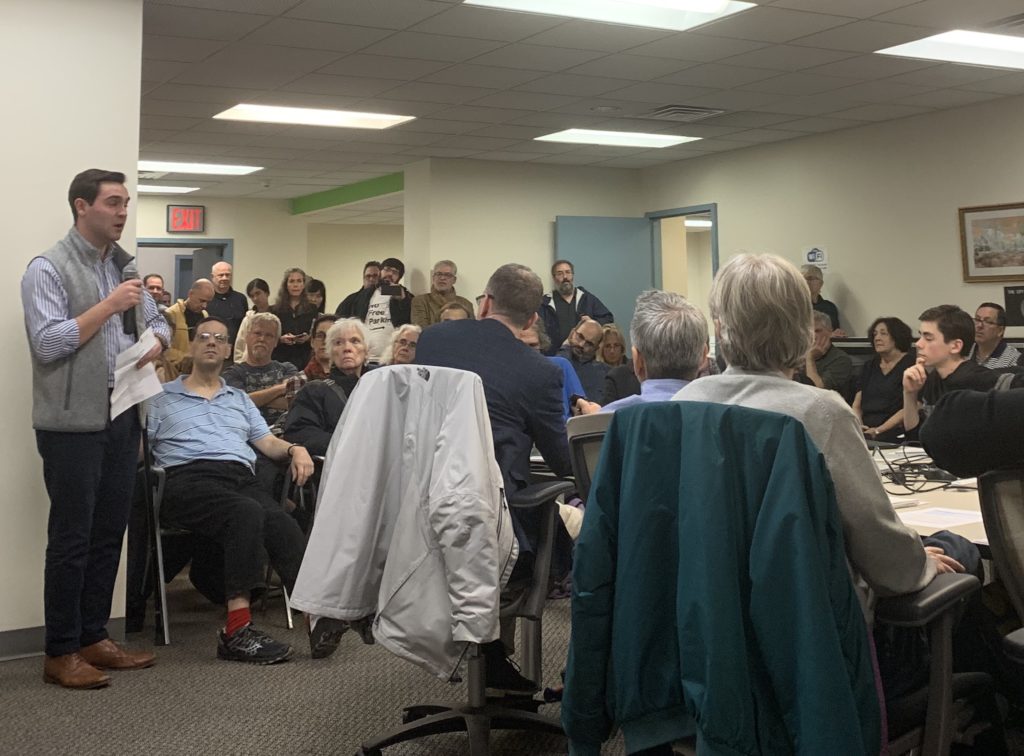
Those who spoke in favor of the resolution believe asking the city to conduct a study is a start toward, at minimum, a more informed understanding of the problems and potential solutions; and at most, marking a significant change to the status quo.
“We need this study because we don’t know what parking costs the rest of us,” said one non-driver.
“As difficult as change may be, times do change,” said another, referencing the initial uproar over the city’s proposed smoking ban during the early aughts and urging the board to take a stand.
After more than 40 local residents shared their testimony, the board members—including some who were not in favor of the resolution as it was initially presented during the Full Board meeting—deliberated.
Some still had reservations, echoing the community’s concerns of bias and wondering if it was premature to request such a study.
“I don’t understand the rush for pushing this now,” asked Barbara Adler, a non-committee board member, who suggested any request for a study could wait until congestion pricing takes into effect.
But following some minor on-the-spot edits, the majority of board members were satisfied with the updated language of the resolution, and expressed a sense of urgency in implementing a study.
“We could have meetings upon meetings … but we’re not going to get anywhere unless we have buy-in from someone who is looking at the data,” said Julian Giordano, the board’s youngest member, in support of the resolution. “My view is that we need a study done as soon as possible.”
“I’m not afraid of a study,” said Doug Kleiman, a Transportation Committee member. “And if that study should be biased, I would be the first to call it out,” he promised.
In an attempt to help steer clear of any perceived bias from the city, non-committee board member Jay Adolf proposed the resolution call for an “independent party” to conduct the study—a suggestion voiced earlier by several members of the public.
But Yaruss and Diller both turned down the notion.
“If they’re biased, we need to go to the polls and vote for new people,” said Howard Yaruss, emphasizing the importance of relying on the Department of Transportation for a constructive solution that they might actually be willing to implement. “We have only one government, and we need to hear from them.”
Diller added that calling for an independent study would likely incur a cost that neither the city nor the board is prepared to pay for.
Ultimately, the resolution passed unanimously from the nine members of the Transportation Committee who were there (the non-committee member vote was split). While some voiced disapproval at Diller’s decision to postpone the full board vote until February, he stood firm on his decision.
With more conversations to follow, the public can look to the Manhattan CB7 website and social platforms for updates on how to participate in further conversations before the resolution is brought to a full board vote in February.






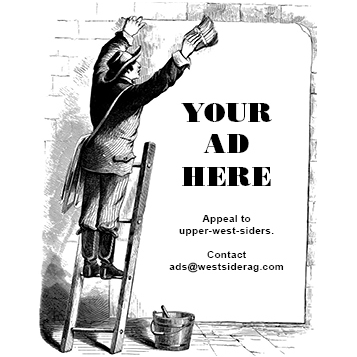
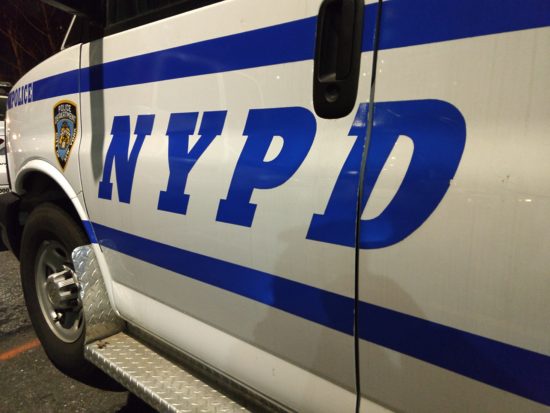

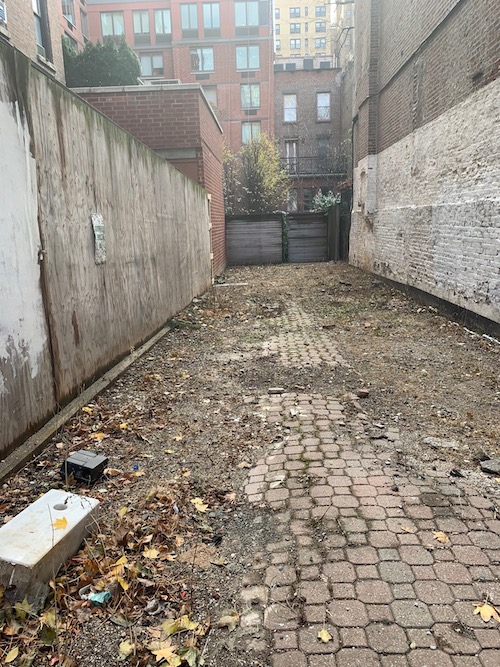
Agree with:
“I don’t understand the rush for pushing this now,” asked Barbara Adler, a non-committee board member, who suggested any request for a study could wait until congestion pricing takes into effect.
Studying the situation now, before congestion pricing kicks in, is like studying for the wrong test
The situation now is not the situation we UWSiders will be living with soon. The study will be outdated practically as soon ad it’s completed. Why do it now? What’s the rush?
To the full board:
Don’t just do something. Sit there.
Mike is correct, but it’s more than that.
In the Spring, with no notice to the general public the Transportation Committee unanimously passed a resolution to radically change 70 years of practice in line with the ideas of a small advocacy group that the Committee chair and vice Chair are active with.
With significant blowback from the community the Committee retreated to a position that basically went from “cars stink, get rid of them,” to “cars stink, let’s study how.” That second resolution was defeated on December 3.
Now, a scant week later, rather than discuss this further and see what possible consensus can emerge we get a third resolution, neatly wrapped and ready to go from a Self-selected committee of activists whose bias is more than amply demonstrated.
We need a new Committee before we get a new resolution.
I agree 100%. Our CB7 Board and the Transportation Sub-Committee are so blatantly anti-car they literally can’t be trusted to propose smart resolutions. They should recuse themselves from any discussion of cars.
The Feds aren’t going to let the congestion pricing plan go without a full environmental review, so there’s no way that congestion pricing will be enacted anytime soon.
Meanwhile, the same issues we have now are going to be present after. So, why wait? Only reason I can see to wait is if you don’t want to know the answer.
I’m sorry to tell you this but the Congestion Pricing Law explicitly exempts the whole of the congestion pricing plan from the State Environmental Quality Review Act and the Uniform Land Use Review Procedure, two mechanisms by which public voices would normally be heard. See page 247 of the adopted bill beginning on line 40 (Sec 1704-6). The absence of a SEQRA review was written about in the NY Law Journal on May 9 by Michael B. Gerrard and Edward McTiernan. Without this exemption, there is NO way the congestion pricing plan could have ever passed SEQRA. Imagine all of the traffic diversions that would have had to been addressed by SEQRA. The legislators prevented any community input going forward. We got screwed!
Congestion pricing is not exempt from federal environmental review. The state has a rosy prediction about how and when they will get federal approval.
Do not replace cars with more noisy polluting trucks!!!
“Do not replace cars with more noisy polluting trucks!!!”
Are you pushing for a ban on Amazon deliveries? Don’t think that would be popular.
I agree with the resolution – should be studying ahead of congestion pricing.
Amazon deliveries are not the problem. It’s the smelly noisy loud trucks that would take the place of cars and squat all day for construction and renovation and air conditioning and heating and plumbing and carpentry and etc and etc. The delivery trucks come and go.
If cars are gone it will be trucks all day! Loud & polluting.
Agreed.
I also agree with “I don’t understand the rush for pushing this now”
I drive a car and ride a bike. I work in Westchester and in Midtown. I drive to Westchester half the time and ride my bike the other half to midtown. I also have elderly parents on LI who I drive to every weekend and sometimes weekdays, when needed. One is suffering with Alzheimers. That is my story and I’m sure is irrelevant to this matter, still it is my story. I watched this committee ignore the residents with cars and push speedily a bike line on CPW. We in no way shape or form needed this bike lane. I ride. the times I do use this bike lane I’m the only one on it. During rush hours mind you. yes, its nice to have but at the expense of 144 parking spots for residents who have always used these parking spots. I find the whole thing that transpired a perfect example of a select few dictating for the whole. That’s only my opinion. Since then my car’s engine is turned on more and I am cruising much longer than I used to. I’m sure I am not alone. Also, I’d like to say that the bikers I have encountered have no interest in following traffic laws. I find the car owners do and have zero choice not to, as they should. I digress. The point I’m making is the community board tends to move in haste.
I am pleased that this group is slowing it down to not make the same mistake. Do the study and I hope it is not bias but you never know. The sentiment is appreciated. Stop doing things in haste is my point.
But most importantly and can’t emphasize this enough,
STOP PUNISHING, YES I MEAN PUNISHING THE RESIDENTS OF THIS NEIGHBORHOOD. I understand that not everyone has a car, but I pretty certain, that no one is driving into Manhattan to park on the UWS in the AM, where there are no longer parking spots available because the residents already occupied those spaces. Just to hop on a subway where they have to pay a metrocard fee. That doesn’t add up. No one is doing that. AND, the congestion pricing hasn’t even started yet. The ones that are getting hurt by this are the current residents. This board is punishing the current residents and this needs to stop. Please STOP PUNISHING THE RESIDENTS ON THE UWS. Figure something else out please.
I am not as active in local politics as I should be. However, I would like to mention that after going to a few of these community board meetings I find the committee as a smug group who’s condescension is palpable. I am not a conservative by any means and have yet to vote that way but I have to say this board is the epitome of what is wrong with the left. I’m sure they are lovely people in person but outside looking in I see a very different picture and I believe I am not the only one. Do we replace them? Sure, but that won’t fix the attitude being potrayed. This is only an observation and I hope whoever is reading this and is on the board take notice and tone down the smug ‘I’m right, your wrong’ attitude. Tone it down please. i.e. only video taping one frustrated citizen (perhaps rightfully so)who doesn’t agree with your viewpoints only to show the crazy side you’re up against. I side with that gentlemen but I also don’t side with his methods. regardless. This is one example I found at this meeting. Nod when you hear both sides. not just your side.
Well said. We have owned a car since 1992. We have never used it to drive in the city except to leave or enter the city and to help friends or relatives move into or out of apartments. A couple of times a year I go to Fairway and buy hundreds and hundreds of dollars of stuff. For 27 years we parked in a close by garage — we paid for parking. Those 700 spaces recently eliminated by the city to allow for construction of homeless and affordable housing. In addition, within the past couple of years my immediate neighborhood lost hundreds of spaces due to street redesign for safety reasons, bike lanes and Citibike stations. I use my car to leave and enter the city. I live in an overwhelmingly residential neighborhood. The only way I can manage to park on the street now is because I am retired and because my car is almost 20 years old so the wear and tear of street parking is not an issue. I am tired of the self serving, evidence free generalizations of the anti car lobby at least as applied to my neighborhood in the low 100’s on the West Side.
Fix midtown, fix the major East West cross streets and leave the rest of us alone.
PLEASE!!!
No more Bike lanes. Cars don’t try to run me over every day. The bikes and scooters do
Maybe they should study traffic patterns by banning all ubers/lyfts/cabs/ etc. from the UWS for 2 weeks and see how much congestion there is then. after that, put a ban on Delivery trucks for two weeks and study the impact of that. I think those two factors are much bigger than residents who own cars. Resident Parking stickers and congestion pricing – if it was enacted below 125th Street instead of 60th St- would be a huge deterrent to doormen and other workers who drive into the city, and take at least 40 mins. out of their workday (with no penalty) to alternate-side park.
The solution to this problem is one that has already been implemented in Washington DC for years: Residential Zone parking. You make the cross streets, West End Ave, Riverside, and CPW restricted to UWS Residents only and leave Broadway, Columbus, and Amsterdam metered. This way, if you’re an UWS resident and your car is registered in NY, you pay a small, nominal fee to the DMV (in DC it’s $35/year or $25 for seniors) and get a sticker for your windshield. Anyone parked on a cross street without a sticker gets ticketed. Simple as that. This provides adequate parking for local residents, while leaving the commercial avenues open for anyone who needs to drive into the UWS for businesses, where they can pay the meter same as anywhere else.
Asking the city to study this is just kicking the can down the road.
I am curious about the people who can’t live without their cars – why you live in one of the few neighborhoods in the entire country that isn’t designed around cars? It would cost less and be more convenient to live in the suburbs.
The Upper West Side is a historic neighborhood that was never designed around cars. We don’t have big box stores with ample free parking. Personally, that’s why I love the upper west side.
I feel like the people who complain that parking here is tough make as much sense as someone who moves to Aspen and then complains about the snow. Why live somewhere when you hate the thing that makes it special and unique?
Who are you to second guess the lives of your neighbors? In fact, the UWS used to be a lot easier for car owners, and many moved here because garages were reasonable and street space was more available than now.
But one can have a subscription to the Philharmonic, see several operas a year, attend the ballet, have four museum memberships, like independent movies and attend theater performances twice monthly AND still own a car.
The only owners who do so casually are those who don’t notice the $700/month garage bill and won’t care if it hits $1,000. But rest assured that every one of your neighbors who owns a car is a human being with the ability to make a rational decision about the neighborhood they want to live in.
“But one can have a subscription to the Philharmonic, see several operas a year, attend the ballet, have four museum memberships, like independent movies and attend theater performances twice monthly AND still own a car.”
And the rationale is that some family that scrapes by in the Bronx should help subsidize this person’s lifestyle just because they own a car. Most of the UWS would reject that and you should too.
Families that are just scraping by in the Bronx are not subsidizing anything or anyone.
And if by chance you have a decent job and pay taxes, you’re paying more every day for subsidies for mass transit than you’re paying every year for the maintenance costs of parked cars.
Families in the Bronx, will starve if truckers can’t get food to their stores, so yes, there’s road maintenance. That benefits these families as it benefits you.
And, 99.99% of that cost bears no relationship to parked cars.
“Families that are just scraping by in the Bronx are not subsidizing anything or anyone.”
Repeating something false will not make it true.
Road repair and maintenance cost all NYC residents $248 million dollars in 2016 and it keeps going up.
This isn’t the 1700s when women did not work and people never traveled more than a few miles from home. There are hardly any high paying jobs in the UWS or large companies. People that don’t work in finance, law or entertainment need to commute out of NYC. We shouldn’t be limited to where we want to live. If tech workers are able to live in San Francisco and commute to where the jobs are, 40 miles south in Silicon Valley to work at Apple, Tesla, Google, etc, we can do it here. Or you can have people that actually pay taxes leave.
The parking spots are not free. We pay plenty in taxes. What this Community Board fails to request, is a survey of whom is parking on our streets. We have numerous out of town parkers, from NJ & CT as well as many other places. I attended the last CB 7 meeting and the members are not focused on improving the quality of life for our neighbors who do drive. There were several members who were worried about global warming. They are are in the wrong place. Their ears appear to be deaf to resident parking permits as many cities already have implemented.
And stop comparing NYC to cherry picked European cities. I have lived all over Europe for work. People are not commuting by bicycle in all large cities. London is about the same size as NYC and hardly anyone commutes by bike. 70% of cyclists are men in NYC. The main transportation dream of the anti car crowd is sexist and not happening in real life. And stop sounding like a teenager with climate change. Propose real life solutions to fix problems, not getting rid of cars without a realistic alternative. The subways are at capacity and can’t handle more riders at rush hour.
You are correct, CB7 board is in embarrassment how they’re handling themselves and who is in charge playing government….enough of them this is not a bicycle city nor are any of the European cities and it’s never going to be in the city… no one is riding bikes! I don’t see people riding bikes on these city streets but less than a handful that I watch on earth cam cameras around the city and I look for bike riders… lucky I see anybody more than 10 fingers on my hands inside an hour. I walk out to Columbus Avenue and watch the bike lane that just sits there with no one on it for hours. Get it through your heads this is not a bicycle city nor is there any other bicycle European cites in the world, other than China because there is no middle class it’s either poor or rich and the poor rides the bikes… it’s a big myth.
The poeple parking their cars on the streets on the uws are salt of the earth people who can’t afford the cost of a monthly garage, don’t punish such honest and hard working neighbors.
I had a street-parked car on the UWS for a number of years. We rarely drove it 6 months out of the year (Nov-April) and basically spent more time alternate side parking than driving. The same could be said for most of my neighbors. A number of them paid our building staff to play the “car dance” twice a week to deal with alternate side parking. Doormen around the neighborhood all did it, we were told. Yes, there are those who live on the UWS who need their cars to commute to work (why they would want to live in the city and do that commute is beyond me). But, by and large, most are like me. We got rid of the car.
Just saying.
[“We need this study because we don’t know what parking costs THE REST OF US,” said one non-driver.] Should we eliminate the subway because we don’t ALL use it? Eliminate libraries because we don’t ALL use them? Eliminate parks because we don’t ALL use them?
Parking permits for neighborhood residents does not require a massive study.
The city can charge neighborhood residents $30-50 dollars a year for a sticker granting the privilege to park within a certain zone.
That keeps visitors needing to use meters or garages. Income for the city and congestion off the neighborhood side streets.
I will also add that on my block, Local Law 11 (now called the Facade Inspection Safety Program, requiring facade work every 5 years) means that there’s at least one massive dumpster taking up parking at any given time. This might be necessary work for safety, but it also sounds like every 5 years is a windfall for contractors.
Let’s just study this until we hit 2 degree global warming. At that point the damage will have been done and we won’t need to ban free parking!